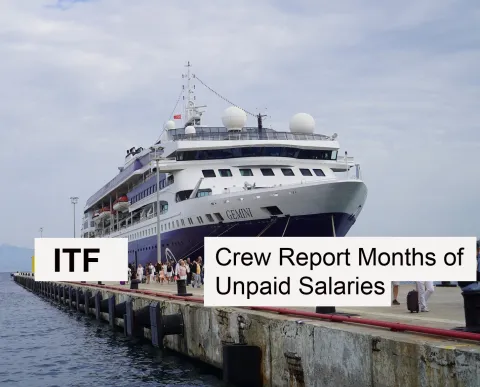
Stress is sometimes good. Even when you work in an extremely difficult environment like a cruise ship, pressure can help you stay focused, energetic, and able to meet new challenges in the workplace. It keeps you on your toes during a work performance or alerts to prevent ship accidents or costly mistakes. But in today's hectic world, and especially on the cruise ship, the workplace too often seems like an emotional roller coaster. Long hours, tight deadlines, and ever-increasing demands can leave you feeling worried, drained, and overwhelmed. And when stress exceeds your ability to cope, it stops being helpful and starts causing damage to your mind and body and your job satisfaction.
You can't control everything in your work environment, but that doesn't mean you're powerless, even when you're stuck in a difficult situation. If the stress on the job interferes with your work performance, health, or personal life, it's time to take action. No matter what you do for a living, your ambitions, or how stressful your job is, you can do plenty of things to reduce your overall stress levels and regain control at work.
Enough has been said about stress and its effects on seafarers at sea. Several studies have depicted how stress and anxiety are taking a major toll on seafarers' mental health.
Working at sea is challenging both physically and mentally. Seafaring is one of the oldest professionals, and seafarers are tough beings with high tolerance levels.
However, over the last few years, maritime professionals have been subjected to additional work-related stresses mainly because of stringent laws and regulations and all the paperwork and formalities that come along with them.
Though there are several techniques known to seafarers to fight stress, most of them provide a temporary solution. The right way would be first to understand the science behind stress and how our brains work, followed by learning techniques to manage such stress levels.
It is high time that shipping companies and Maritime authorities give more importance to seafarers' mental health through adequate training and bringing in some fundamental changes in how the shipping industry operates.
Such a major change will take some time, and until then, seafarers must fight the menace of stress and anxiety on their own by learning about tools and techniques that are easy to learn and follow when at sea.
A good way to deal with stress is to recognize the signs and accept the situation that you are in. Most of the time, several seafarers take it as a way of life and are always in a state of denial, which eventually might lead to a nervous breakdown.
Therefore, managing and reducing your stress by reading the signs and breaking the cycle is very important.
And one crucial way of doing this is by striking a balance between work and life.
Most of the time, seafarers don't know they are in stress. Many people believe working hard and being in "always-on" mode is necessary to succeed. Though working hard is important, having time to unwind and destress is also important to maintain one's sanity. We must understand the neuroscience behind stress and learn techniques to reduce stress and return the body to a relaxed state.
As a seafarer at sea, If you are dealing with any anxiety or stress, you must take care of yourself at the right time and in the right way. But it is impossible to stay away from stress completely, so finding ways to live a happy, healthy, and more relaxed life is important.
We all have been in situations wherein some external stimuli force us into a vortex of difficult thoughts to escape. Sometimes, these nagging thoughts and worries are so strong that they are difficult to eliminate, eventually leading to stress and anxiety.
Seafarers are often stressed from work issues at sea and personal issues left behind at home.
It is a helpless situation wherein you cannot be at home to resolve the pending issues and instead have to deal with the professional load without much emotional support or help.
As seafarers, we all want more emotional freedom and control of life.
A ship can be an intimating place to work with more than one can handle. Most seafarers are always counting the days to sign off, not just because the ship is a hard place to live but mainly because working with the same set of people over an extended period of time can become mentally taxing.
Sometimes the best stress reducer is simply sharing your stress with someone close to you. Talking it out and getting support and sympathy—especially face-to-face—can be a highly effective way of blowing off steam and regaining your sense of calm. The other person doesn't have to "fix" your problems; they need to be a good listener. That already makes such a great difference by being compassionate and empathic.
Having a solid support system at work can help buffer you from the negative effects of job stress. Just remember to listen to them and offer support when needed. If you don't have a close friend on the ship, you can be more social with your coworkers. When you take a break, for example, try engaging your colleagues instead of directing your attention to your smartphone.
As well as increasing social contact at work, having a strong network of supportive friends on the ship is extremely important to managing stress in all areas of your life. Conversely, the lonelier and more isolated you are, the greater your vulnerability to stress.
Make time for regular exercise
Aerobic exercise—an activity that raises your heart rate and makes you sweat—is a hugely influential way to lift your mood, increase energy, sharpen focus, and relax both the mind and body. Rhythmic movement—such as walking, running, dancing, drumming, etc.—is incredibly soothing for the nervous system. For maximum stress relief, try to get at least 30 minutes of activity on most days. If it's easier to fit into your schedule, break up the activity into two or three shorter segments.
And when stress is mounting at work, try to take a quick break and move away from the stressful situation. Take a stroll outside the workplace. Physical movement can help you regain your balance. If you feel tired, hit that gym, regardless. Learn not to give in to your excuses regarding your daily workout routine. If you become disciplined enough and manage to go to the gym at least three times a week, you will surely become less stressed and in charge of your emotions.
Practice self-talk.
If you are in a heated conversation with your guest or fellow crew members, learn how to control your emotions and remain calm regardless of the circumstances. You are in charge of every situation; you choose how you are going to react in different circumstances.
Treat yourself in the port
Learn how to treat yourself once in a while. Regardless of the circumstances of your life on board, always reward yourself for a small achievement. Celebrate "small success." That is the key to reducing stress and feeling accomplished and happy.
Make smart, stress-busting food choices
Your food choices can greatly impact how you feel during the workday. For example, eating small, frequent, and healthy meals can help your body maintain an even blood sugar level. This maintains your energy and focus and prevents mood swings. Low blood sugar, conversely, can make you feel anxious and irritable while overeating can make you lethargic.
Minimize sugar and refined carbs. You may crave sugary snacks, baked goods, or comfort foods such as pasta or French fries when stressed on the cruise ship. But these "feel-good" foods quickly lead to a crash in mood and energy, worsening symptoms of stress, not better. Your productivity levels will go down instantly before you even notice it.
Drink alcohol in moderation. Alcohol may seem like it temporarily reduces your worries, but too much can cause anxiety as it wears off and adversely affects your mood.
Whatever option you choose to reduce your stress levels, remember to keep it in moderation and balance if you want to feel calm and stress-free; learn how to control your mind and practice staying calm in difficult situations on cruise ships. Remember, maybe you can't control other people's behavior, but you can surely control how you react to circumstances around you. Have a great contract!
Crew Insights
Articles and experiences shared by crew members working on cruise ship. Find out more about ship life at sea together with tips and advices for first time crew members and cruise oldtimers.












